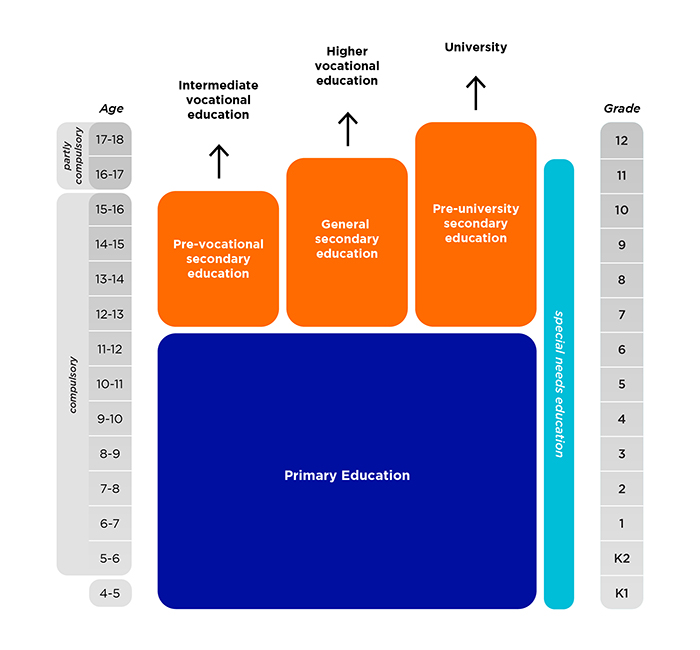The Dutch education system
The Dutch school system consists of three stages: primary education, secondary education and higher education. Education is compulsory in the Netherlands from the ages of 5 to 16. However, most children start to attend primary school at age four. In the Netherlands, pre-primary (Kindergarten) and primary education are offered together at one school and jointly consist of eight grades. Most students are about 12 years old when they start secondary education and enrol in one of the following tracks:
- pre-vocational secondary education (vmbo);
- general secondary education (havo);
- pre-university secondary education (vwo).
Some schools offer mixed classes (vmbo-havo or havo-vwo) in the first two or three years of secondary education, in order to maximize pupils’ opportunities to fulfil their potential. People aged between 16 and 18 who have not yet obtained a starting qualification are required to do so. A starting qualification is at least a havo, vwo or mbo (vocational education) diploma. Students with learning disabilities are exempt from this requirement.

Freedom of education
Dutch schools have significant autonomy. This is based on the constitutional freedom of education. Each resident of the Netherlands has the right to found a school based upon certain religious, philosophical or pedagogical principles. There are only a few conditions for this, for example that a school based on similar principles does not already exist in the same municipality. Schools may autonomously decide how to organise their education, as long as they make sure that they offer all the content that is legally prescribed by the mandatory goals for education. They are free to realise their teaching according to their own views and principles.
National goals and attainment targets
The government lays down statutory requirements for education and sets the framework within which schools should perform. These include Core objectives for primary education and the lower grades of secondar education, a Reference Framework for Language and Mathematics for primary, secondary and vocational education, and Exam programmes for secondary education.
The schoolboard is responsible for the school and for the quality of education, including meeting the obligatory attainment targets. The Dutch Inspectorate of Education makes visits at least once every four years to ascertain whether schools, both public and private, meet the general targets and provide the expected quality of education.